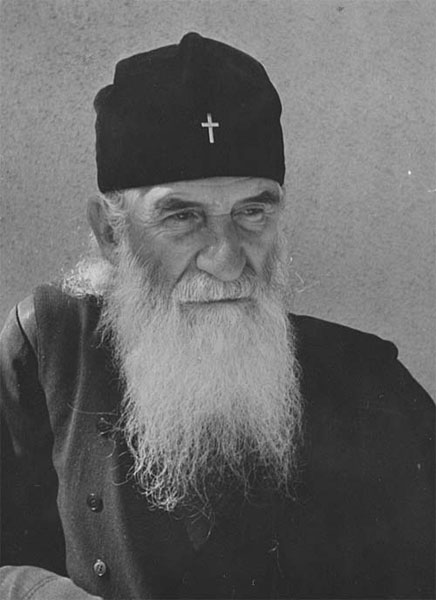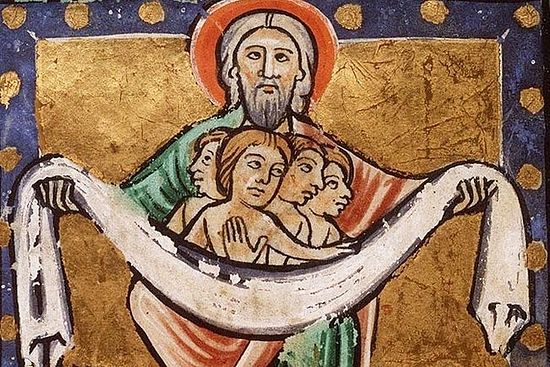Life & Faith
Life Of Our Father Justin Archimandrite of Chelije
 Troparion, Tone 4
Troparion, Tone 4
As Orthodox sweetness and divine nectar, Venerable Father* thou dost flow into the hearts of believers as a wealth:* by thy life and teachings thou didst reveal thyself to be a living book of the Spirit, most wise Justin;* therefore pray to Christ the Word* that the Word may dwell in those who honor thee.
In the Name of the Father, the Son, and the Holy Spirit: Holy love has a way of consuming some. This is what is meant by one who said "Thou hast ravished our hearts, ravished them" (Song of Songs 4:9). And it make others bright and overjoyed. In this regard it has been said "My heart hath hope in Him, and I am helped and my flesh hath flourish again" (Ps. 27:7). "For when the heart is cheerful, the face beams" (cf.Prov.15:13), and "a person flooded with the love of God reveals in his body, as if in a mirror, the splendor of his soul, a glory like of Moses when he came face to face with God" (cf. Ex. 34:29-35) - St. John Climacus.
Saint Basil the Great, Archbishop of Caesarea
 Basil was born during the reign of Emperor Constantine. While still unbaptized, Basil spent fifteen years in Athens where he studied philosophy, rhetoric, astronomy and all other secular sciences of that time. His colleagues at that time were Gregory the Theologian and Julian, later the apostate emperor. In his mature years he was baptized in the Jordan River along with Ebulios his former teacher. He was Bishop of Caesarea in Cappadocia for almost ten years and completed his earthly life fifty years after his birth.
Basil was born during the reign of Emperor Constantine. While still unbaptized, Basil spent fifteen years in Athens where he studied philosophy, rhetoric, astronomy and all other secular sciences of that time. His colleagues at that time were Gregory the Theologian and Julian, later the apostate emperor. In his mature years he was baptized in the Jordan River along with Ebulios his former teacher. He was Bishop of Caesarea in Cappadocia for almost ten years and completed his earthly life fifty years after his birth.
He was a great defender of Orthodoxy, a great light of moral purity, a religious zealot, a great theological mind, and a great builder and pillar of the Church of God. Basil fully deserved the title "Great." In liturgical services he is referred to as the "bee of the Church of Christ, which brings honey to the faithful and with its stinger pricks the heretics." Numerous works of this Father of the Church are preserved; they include theological, apologetical, ascetical and canonical writings as well as the Holy and Divine Liturgy named after him. This Divine Liturgy is celebrated ten times during the year: on the first of January, his feast day; on the eve of the Nativity of our Lord; on the eve of theTheophany of our Lord; all Sundays of Great Lent, except Palm Sunday; on Great and Holy Thursday and on Great and Holy Saturday. St. Basilreposed peacefully on January 1, 379, and was translated into the Kingdom of Christ.
The Holy Protomartyr Stephen the Archdeacon
The Holy Protomartyr Stephen the Archdeacon Stephen was a kinsman of the Apostle Paul and one of those Jews who lived in the Hellenic provinces. Stephen was the first of the seven deacons whom the holy apostles ordained and appointed to the service of assisting the poor in Jerusalem. For this, he is called the archdeacon. By the power of his faith, Stephen worked great miracles among the people. The wicked Jews disputed with him, but they were always defeated by his wisdom and the power of the Spirit, Who acted through him. Then the shameful Jews, accustomed to calumnies and slander, incited the people and the elders of the people against the innocent Stephen, slandering him as though he had blasphemed against God and against Moses. False witnesses were quickly found who confirmed this. Stephen then stood before the people, and all saw his face as it had been the face of an angel (Acts 6:15), that is, his face was illumined with the light of grace as was once the face of Moses when he spoke with God. Stephen opened his mouth and enumerated the many good works and miracles that God had performed in the past for the people of Israel, as well as the many crimes and opposition to God on the part of these people. He especially rebuked them for the killing of Christ the Lord, calling them betrayers and murderers (Acts 7:52). And while they gnashed their teeth, Stephen beheld and saw the heavens open and the glory of God. That which he saw, he declared to the Jews: Behold, I see the heavens opened and the Son of Man standing on the right hand of God! (Acts 7:56). Then the malicious men took him outside the city and stoned him to death. Among his persecutors was his kinsman Saul, later the Apostle Paul. At that time, the Most-holy Theotokos, standing on a rock at a distance with St. John the Theologian, witnessed the martyrdom of this first martyr for the truth of her Son and God, and she prayed to God for Stephen. This occurred one year after the descent of the Holy Spirit upon the apostles. Gamaliel, a prince of the Jews and a secret Christian, clandestinely took St. Stephen’s body and buried it on his own estate. Thus, this first among the Christian martyrs gloriously reposed and took up his habitation in the Kingdom of Christ God.
The Sunday of the Holy Forefathers
 In the Name of the Father and of the Son and of the Holy Spirit.
In the Name of the Father and of the Son and of the Holy Spirit.
'Many are called but few are chosen'. So says Christ in today's Gospel. If we think of the knowledge of God conserved among different peoples in the world before Christ, these words have a special significance.
Saint Spyridon the Wonderworker, Bishop of Tremithus
![]() The island of Cyprus was both the birthplace and the place where this glorious saint served the Church. Spyridon was born of simple parents, farmers, and he remained simple and humble until his death. He married in his youth and had children, but when his wife died he devoted himself completely to the service of God. Because of his exceptional piety, he was chosen as bishop of the city of Tremithus. Yet even as a bishop, he did not change his simple way of living, handling his livestock and cultivating his land himself. He used very little of the fruits of his labor for himself; instead, he distributed a greater share to the needy. He manifested great miracles by God’s power: he brought down rain in time of drought, stopped the flow of a river, raised several people from the dead, healed Emperor Constantius of a grave illness, saw and heard angels of God, foresaw future events, discerned the secrets of men’s hearts, converted many to the true Faith, and did much else. He took part in the First Ecumenical Council in Nicaea [325], and he brought many heretics back to Orthodoxy by his simple and clear ex- positions of the Faith as well as by his mighty miracles. He was so simply dressed that once, when he wanted to enter the imperial court at the invitation of the emperor, a soldier, thinking that he was a beggar, struck him on the face. Meek and guileless, Spyridon turned the other cheek to him. He glorified God through many miracles and was of benefit, not only to many individuals but also to the whole Church of God. He entered into rest in the Lord in the year 348. His miracle-working relics rest on the island of Corfu, and even today they glorify God with many miracles.
The island of Cyprus was both the birthplace and the place where this glorious saint served the Church. Spyridon was born of simple parents, farmers, and he remained simple and humble until his death. He married in his youth and had children, but when his wife died he devoted himself completely to the service of God. Because of his exceptional piety, he was chosen as bishop of the city of Tremithus. Yet even as a bishop, he did not change his simple way of living, handling his livestock and cultivating his land himself. He used very little of the fruits of his labor for himself; instead, he distributed a greater share to the needy. He manifested great miracles by God’s power: he brought down rain in time of drought, stopped the flow of a river, raised several people from the dead, healed Emperor Constantius of a grave illness, saw and heard angels of God, foresaw future events, discerned the secrets of men’s hearts, converted many to the true Faith, and did much else. He took part in the First Ecumenical Council in Nicaea [325], and he brought many heretics back to Orthodoxy by his simple and clear ex- positions of the Faith as well as by his mighty miracles. He was so simply dressed that once, when he wanted to enter the imperial court at the invitation of the emperor, a soldier, thinking that he was a beggar, struck him on the face. Meek and guileless, Spyridon turned the other cheek to him. He glorified God through many miracles and was of benefit, not only to many individuals but also to the whole Church of God. He entered into rest in the Lord in the year 348. His miracle-working relics rest on the island of Corfu, and even today they glorify God with many miracles.
Life of Saint Nicholas the Wonderworker, Archbishop of Myra
 This glorious saint, celebrated even today throughout the entire world, was the only son of his eminent and wealthy parents, Theophanes and Nona, citizens of the city of Patara in Lycia. Since he was the only son bestowed on them by God, the parents returned the gift to God by dedicating their son to Him.
This glorious saint, celebrated even today throughout the entire world, was the only son of his eminent and wealthy parents, Theophanes and Nona, citizens of the city of Patara in Lycia. Since he was the only son bestowed on them by God, the parents returned the gift to God by dedicating their son to Him.
St. Nicholas learned of the spiritual life from his uncle Nicholas, Bishop of Patara, and was tonsured a monk in the Monastery of New Zion founded by his uncle. Following the death of his parents, Nicholas distributed all his inherited goods to the poor, not keeping anything for himself. As a priest in Patara, he was known for his charity, even though he carefully concealed his charitable works, fulfilling the words of the Lord: Let not thy left hand know what thy right hand doeth (Matthew 6:3).When he gave himself over to solitude and silence, thinking to live that way until his death, a voice from on high came to him: ``Nicholas, for your ascetic labor, work among the people, if thou desirest to be crowned by Me.'' Immediately after that, by God's wondrous providence, he was chosen archbishop of the city of Myra in Lycia. Merciful, wise and fearless, Nicholas was a true shepherd to his flock.

